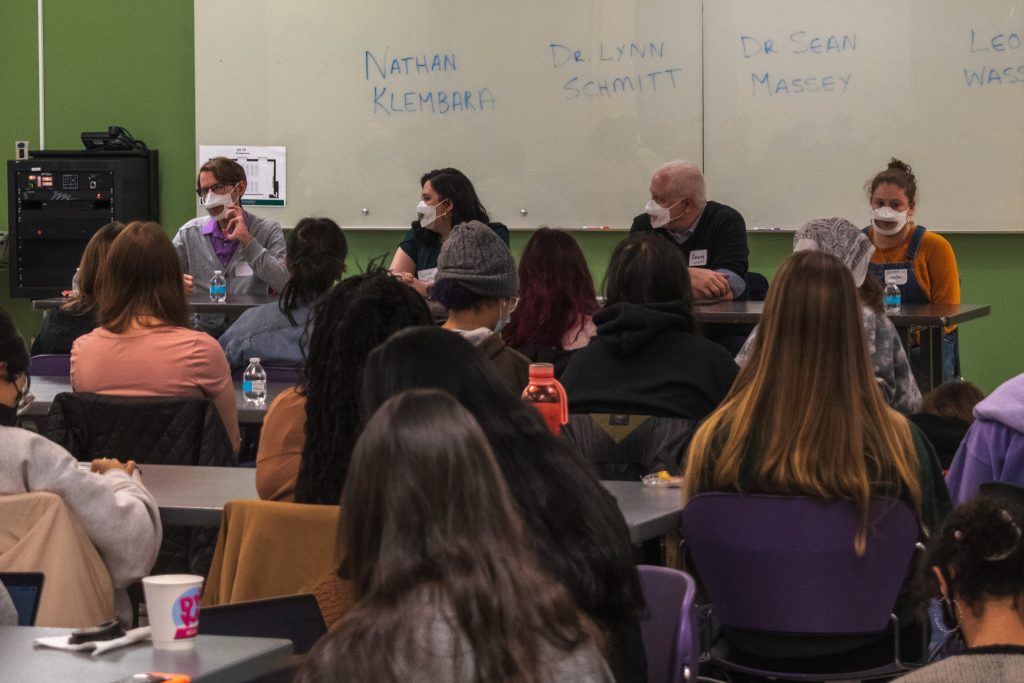Around 70 students attended a “LGBTQIA+ Research Roundtable” this Tuesday, with panelists from the Binghamton University student body and faculty.
While Vanessa Jaeger, the assistant director of the External Scholarships and Undergraduate Research Center, helped organize the roundtable, Jaeger wrote in an email that the event was largely organized by Shermont Bradwell, a senior majoring in psychology, who acts as the undergraduate research ambassador for the External Scholarships and Undergraduate Research Center.
Panelists included Nathan Klembara, a fourth-year Ph.D. candidate studying queer theory in archaeology, Lynn Schmitt, an adjunct lecturer of chemistry and postdoctoral researcher, Sean Massey, a researcher and associate professor of women, gender and sexuality studies and Leora Wasserman, a junior double-majoring in psychology and English who is an undergraduate researcher for the Human Sexualities Lab.
The event kicked off with Bradwell introducing the panelists. Bradwell asked a variety of questions to the panelists, leaving time for audience questions at the end. Panelists were given the opportunity to discuss their lives and professional experiences as people of the queer community.
Massey told attendees about his time during the AIDS epidemic in New York City, where he began his education in psychology.
“Eventually I found my way to Hunter College, New York City, during bad times during the AIDS epidemic,” Massey said. “I was very much a part of the AIDS movement as a volunteer and researcher.”
Schmitt discussed their experience in science, technology, engineering and mathematics (STEM) and chemistry.
“As far as I know, I’m the only queer person out in the chemistry department,” Schmitt said. “For some of my students, I might be the only queer chemist they know, and I want to be there for them as an example of a successful queer chemist who has their Ph.D.”
Schmitt also described their experience with misgendering in the workplace.
“I started paying attention and noticing how I would get misgendered,” Schmitt said. “It seems little at first, happens once, happens twice. And then it comes to the point where … you’ve told several people once or twice, and you have six people refer to you as ‘she.’ It feels piddling, and I came to see why some people would leave.”
Klembara said one of their mentors and a leading researcher in the queer archaeology field was denied tenure because their research “wasn’t rigorous enough,” according to their tenure committee. Klembara went on to say this individual switched to the private research sector.
When asked about how the University handles queer research, the panelists had some recommendations.
“We have a lot of work to do before students get here,” Massey said. “Comprehensive sex education is still lacking pretty much everywhere. Thinking of the professional schools on campus, we’re training the social workers and teachers and so forth that are going out into the world and having an effect, and the people they are interacting with are coming here.”
Massey advocated for a more comprehensive sex education, whether through the University or lower education.
Wasserman, who works as a tour guide for the University, said BU could do more for its students before they arrive on campus.
“The University seems to be kind of dismissive of sex education,” Wasserman said. “We just this year started doing names and pronouns when you introduce yourself to your [tour] group, and for what we include in the tours, the diversity thing is a three-line throwaway — the [Multicultural Resource Center (MRC)] and our actual statistics, and I think that goes back to what can we do before people come to campus. There are queer students here, we’re not just a number, we’re not just the Q Center. Sex education and queer education are so important to individual identities, and the way our University handles them definitely has an impact on our students.”
Klembara said that the University has become too loose in its academic requirements and can do more in its curriculum for queer and sex education.
“A stricter liberal arts curriculum across the board would force students to confront things they’re uncomfortable with or challenge them,” Klembara said.
While optimistic about the event’s discussion, Bradwell hopes future panels will be more diverse.
“We have differences in terms of age and [generations], we have a graduate student and an undergraduate student, we have a panelist well into their tenure and one just starting off,” Bradwell said. “I wish we had some more Latinx or Black panelists, so we could talk about intersectionality. These panelists might not want to do that because they don’t have that experience.”
At the end of the event, Briana Lopez-Patino, a sophomore majoring in philosophy, said that events like this “LGBTQIA+ Research Roundtable” are necessary, so undergraduate students can have important conversations.
“I think these discussions are necessary especially at the undergraduate level, because it creates a comfortable environment for people to ask questions and meet researchers established in their fields,” Lopez-Patino said.
At the conclusion of the “LGBTQIA+ Research Roundtable,” Bradwell asked panelists what people who identify as allies can do for the queer community.
Massey provided advice that the entire panel agreed on.
“Know what the word means,” Massey said. “Don’t just do it when we can see you. Be an ally when we can’t.”



